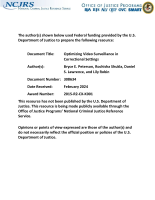Physically handicapped
Comparative Forensic Soil Analysis of New Jersey State Parks Using a Combination of Simple Techniques with Multivariate Statistics
Management of Special Populations: Mentally Disabled Offenders: Final Report
Reduced Recidivism and Increased Employment Opportunity Through Research-Based Reading Instruction
Sex Estimation Using Metrics of the Innominate: A Test of the DSP2 Method
Development and Evaluation of a Nontargeted Electrochemical Surface-Enhanced Raman Spectroscopy (EC-SERS) Screening Method Applied to Authentic Forensic Seized Drug Casework Samples
Celebrating 10 Years of NIJ’s Law Enforcement Advancing Data and Science (LEADS) Scholars Program - 2024 NIJ Research Conference
In 2014, NIJ established the Law Enforcement Advancing Data and Science (LEADS) Scholars Program to support research-minded, mid-career sworn law enforcement officers working to integrate research into agency policy and practice. The LEADS Scholars Program helps participants develop independent research and provides support to identify current evidence on priority issues.
See the YouTube Terms of Service and Google Privacy Policy



